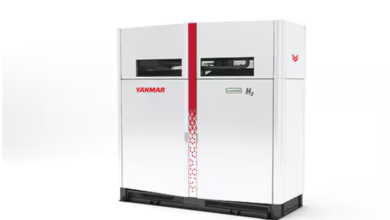Hengst presents a modular system of various filtration solutions for the fuel cell

Hengst presents a modular system of various filtration solutions for commercial vehicle and off-highway applications.
To support the use of hydrogen as a climate-friendly energy carrier, Hengst has developed a modular set of various filtration solutions for fuel cells. At Hydrogen + Fuel Cells in Hannover, the specialist in filtration and fluid management will present products for coolant and air filtration, and in the area of system integration, a water separator for anode recirculation.
“To protect our planet, CO₂-neutral drives are essential. That’s why we at Hengst have been developing filtration solutions for hydrogen-powered vehicles and generators. The product of our innovation and long years of international experience: high-performance ion exchangers, cathode air filters and water separators for fuel cells”, resumes Mathias Diekjakobs. At Hydrogen + Fuel Cells in Hannover, together with other experts from Hengst, he will be presenting modular solutions, as well as the possibilities for customization.
During fuel cell operation, ions are introduced into the coolant. These result from the aging of the coolant itself or from components in the coolant circuit. Effective filtration is therefore required to ensure the safe operation of the fuel cell. The innovative Blue.iox ion exchanger from Hengst offers an exceptionally high level of protection with minimum maintenance. The unique design of the filter cartridge with axial filter flow and the special mixed bed resin system for cation and anion exchange ensure high filtration efficiency over the entire service interval. The ion concentration in the coolant circuit is thus reduced very rapidly.
Hengst offers various sizes in its modular program, to meet the requirements of smaller systems as well as fuel cell systems for heavy-duty machinery and stationary and maritime applications. Besides offering standard solutions, the core competency of Hengst is system integration, which is put to use here in the development of customized ion exchanger concepts. The Blue.iox from Hengst is also designed for easy maintenance: A screw cap allows the filter cartridge to be replaced cleanly without special tools, while integrated shut-off valves prevent coolant from escaping.
The airflow of a fuel cell also requires special filtration. To ensure long service life and high performance, the intake air must be very thoroughly cleaned of airborne particles. In addition, pollutants such as nitrogen oxides (NOx), ammonia (NH3) and sulphur dioxide (SO2) can cause unwanted deposits in the fuel cell and damage it. A specially developed cathode air filter system from Hengst with a multilayer structure reliably protects the fuel cell components from particles as well as harmful gases.
Different filtration systems can be implemented depending on the requirements and application. For example, highly effective particle filtration can be applied directly with gas filtration in a combination medium. For more stringent dust collection requirements, a pleated particulate filter medium is used as a separate filter stage upstream of the gas filtration. The application areas of the filter system include trucks and buses; on-highway and off-highway vehicles, stationary systems and industrial applications, whereby Hengst designs for robustness and easy filter servicing.
To prevent liquid water deposits and thus ensure the continuous effective operation of the fuel cell, proper water management is crucial. The solution from Hengst: a new type of separator module for anode gas recirculation. It combines the function of droplet water separation and gas drainage with an innovative valve configuration of the purge and drain valve. Highly integrative solutions are one of the strong points of Hengst.
